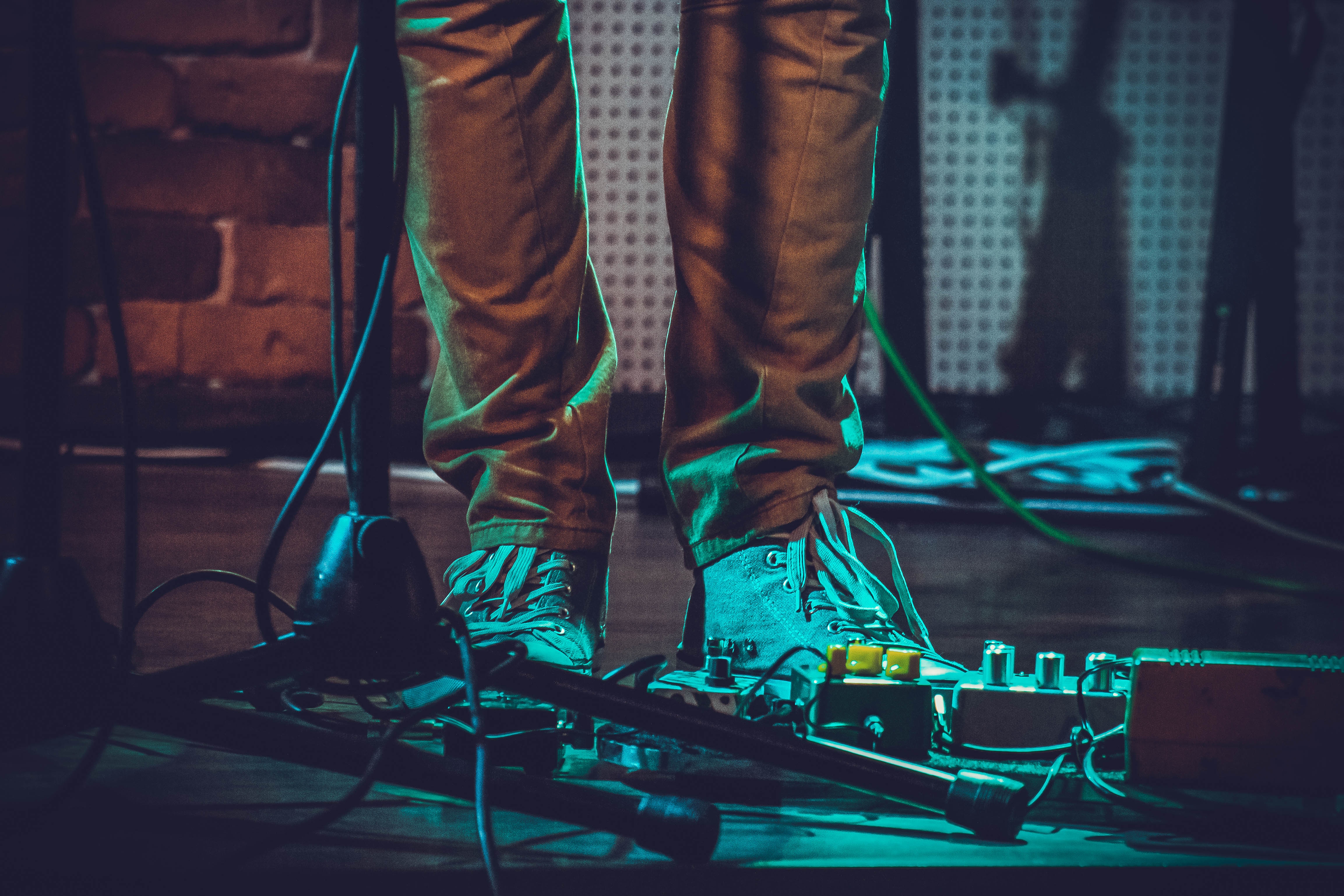Many blogs about self-marketing and music production suggest saying no to free gigs. Artists shouldn’t play for free, because all that time and effort it took practising, writing, rehearsing, and promoting your music shouldn’t go unpaid. If you hire, say, a roofer, you don’t expect them to fix your roof for free, do you? And all this is true. Ideologically speaking, no artist should go unpaid. And while up-and-coming artists with one foot in the door of the local or regional music scene could actually benefit from such a stance, it’s poison for bands that just started.
In an ideal world, even the most unknown band would have plenty of opportunity to play, an abundance of excited and well-paying listeners just waiting for them to take the stage — and at the end of the day, everyone would get paid their fair share. Sadly, this is little more than a utopia.
The reality looks entirely different: if most amateur bands would stop taking free gigs, they wouldn’t play at all. If your local situation is anything like mine, finding nice venues that are willing to risk booking unknown bands is a blessing. Even without pay. Demanding to be paid a guaranteed fee is a way of ensuring that a new band will probably never play.
Careful! Maths! Or: An Exemplary Calculation
Let’s crunch the actual numbers and assume the following:
- You make $20/hour with your day job (which is even below the US average)
- Setting up, soundchecking and performing takes something around four hours (it never does)
- Your band consists of four people (with no roadies, merch agents and sound techs to account for)
That’d still be $20 × 4 × 4 = $320 to be economically viable — for a single gig. Not even accounting for gas money, bus rental, wear and tear of equipment, the price of this equipment in the first place, “consumables” like guitar strings and the countless hours spent practising and rehearsing. Knowing the business both as a musician and a promoter I know that payment in this ballpark is only realistic for bands that have a decent local following and can fill a venue. For young and starting bands, it’s completely unachievable.
Supply, Demand and the Break-Even Point
Now that I’ve bothered you with maths, I’ll continue bothering you with basic economics. Because that’s what it all comes down to. There’s a huge oversupply of bands and artists. Because everybody and their brother is in a band — and that’s a good thing! — the supply vastly outweighs the demand. There are hundreds of bands competing over only a few available slots.
If you are a promoter, there are certain fixed expenses that you’ll have, including: the sound tech (if the band doesn’t bring one), catering and especially the rent of the venue. Even if the venue itself acts as the promoter, bar staff and the property isn’t free either. Promoters and venues both want the same thing: to at least reach the break-even point. That’s the point where cost and revenue match.
Booking a band for $320 significantly ramps up the cost. That means that in order to be lucrative, the revenue needs to be at least as high. This is reasonable for bands that attract a big enough following and completely fill the venue. Entry fees and drinks all generate enough money to account for the expenses. The situation is different when the band is comparatively unknown. No sensible promoter would book a band that has no significant following for the same money as a band that does, because there is no way of ensuring that enough revenue will be generated to account for the costs.
There is, however, a way that an unknown band can be interesting (economically) to a venue: reducing the cost and with that, the risk.
The Minimum Wage Argument
“But,” you’ll say, “there are minimum wage laws. It’s illegal to hire someone and not pay them.”
Here’s the thing: as a musician, you’re self-employed. That means you don’t qualify as an employee to whom minimum wage laws apply. Technically, you’re a company making business with another company (the venue or promoter). Even if there was a minimum wage for musicians, it wouldn’t be the promoter’s obligation to pay that, it would be the band’s.
Let’s use our roofer example once again: a roofer (to whom minimum wage applies) is not paid by the individual contractors, they’re paid by the company they work for. If the company makes ridiculously underpriced contracts and thus can’t pay the worker’s minimum wage, that’s not the contractor’s (i. e. the guy with the broken roof) fault. The company’s mismanagement is responsible. As a musician, you’re not the roofer, you’re the roofing company. Actually, you’re both of them at the same time. That’s what makes the situation so special.
“But”, you’ll say, “bar staff, the venue and the sound guy are all getting paid. Why should the band be responsible for handling the risk?”
You’re right, they shouldn’t and if the system works that way, why don’t we just change it? If no band would play for free, surely that system would have to undergo some degree of change? Here’s the cruel truth: venues have no moral obligation to support unknown artists. If booking new bands was a financial liability, they would just cease to do so and nothing could stop them. But who would benefit from a situation like that? Venues wouldn’t have new music to entertain their peers with, unknown bands wouldn’t be able to play anymore and music fans wouldn’t be able to discover new music.
There’s something else besides money that venues can offer when they book a band and that’s exposure and practise.
Practise
Let’s start with practise. Every gig you play is a valuable lesson you just can’t learn inside the rehearsal room. Seeing how a real, live audience reacts to your music is a whole different ballpark than playing in front of your band members that have heard the songs countless times. It’s also a valuable way to receive an honest response by talking to the audience after the gig. Especially for young bands not yet good enough for the big shows, playing unpaid shows might be a way to test the waters without having to live up to the expectations of a professional.
Exposure
I know that some ruthless promoters use the exposure card as a way to trick artists not versed in business into disadvantageous contracts. The Oatmeal did a great comic about this and raises a valid point, but think about it this way: your desirability as an artist — at least for venues — largely depends on three factors: the size of your following (= their potential revenue), cost and entertainment value.
There’s a vicious circle going on: artists want to be paid, but in order to get paid, they need fans. In order to get fans, they need to play live. In order to play live, they need gigs. In order to get gigs as an unknown band, you’ll have to play for free.
If you’re a great young artist that just started out and has no following, playing free shows in front of the venue’s regulars might be a way to attract your first fans. Once you’ve got a decent following, you can begin to charge for your concerts, because you bring enough buying power into the venue to make it worthwhile to them.
So, yes. Playing for exposure might be a double-edged sword, but it’s the only way you can escape this vicious circle. We’ve gotten most of our gigs due to people seeing us at our live shows, recommending us to their friends — and word of mouth. If quick money is what you’re aiming for, music might be the wrong business. That being said, making money at an otherwise unpaid gig is still possible:
How You Can Still Make Money by Playing for ‘Free’
Even when playing without a guaranteed fee, I’d try to negotiate a so-called door split. That means that entry fee earnings get split between you and the venue. It’ll take the risk of having to pay a guaranteed sum (regardless of turnout) away from the venue and still reimburses you, should the gig be a financial success.
If that’s not possible, selling CDs, shirts, and other merch is a good way to earn at least some money. Merch also has the added benefit of working as promotion material: your fans could share their CD with their friends who could also become fans. It’s much more valuable to use the gig to network, especially if you’re the opener for a bigger band.
If you’re playing in a pub without an entry fee, invite the audience to tip you if they liked your performance.
Sure, none of this will ever bring you close to that Italian sports car you’ve been dreaming of — but face it: you’re in the wrong branch for that.
When You Really Shouldn't Play
I will cover this in-depth at a later point with a separate article, but here’s the short version: there are some circumstances where you shouldn’t play for free and those are shows that have no benefit to you. Repeatedly playing the same venue in a short period of time isn’t necessarily going to attract you new fans, as is playing really bad and short slots. If you’re a metal band that’s opening a hip-hop festival, don’t expect to make a lot of friends. If you’re an eight-piece ska band, playing on a stage the size of a compact car might not be the most sensible choice.
I know that new artists can’t exactly be picky about what shows they play, but if a gig doesn’t help you and your music, don’t accept it unless it pays well. Be smart about what shows you play and don’t just take every offer presented to you without weighing the pros and cons.
Don't Pay to Play!
While I encourage considering playing for free, I’m opposed to pay-to-play. Be very careful when signing a contract that makes you pay any sort of upfront fee or deposit — you’ll likely won’t get the money back.
And even gigs that are considered ‘free’ can have secret hidden costs. Most of the time, these come as some sort of pre-sale: the band has to take a certain amount of tickets upfront and sell it to their fans. The revenue is then divided between the band and the promoter, although the band did all the work (and took all the financial risk).
Bear in mind that gas and parking isn’t free, either. Travelling around the country for a show that doesn’t guarantee any payment, only to play in front of a dozen people is a bad choice, so is playing the same local venue over and over again.
If you share your equipment with a much bigger band that gets paid big time, it’s only fair that you get some share of their salary as well.
The Bottom Line
Long story short:
- Telling artists to never play unpaid gigs isn’t good advice, especially at the beginning of their career.
- Making money shouldn’t be the primary focus of new artists, since attracting new fans is much more important.
- When booking shows, reducing their cost (and thus, playing for free) might be the only way unknown bands can compete with seasoned veterans who attract a huge following.
- Be careful and try to avoid pay-to-play scams that seek to exploit young artists financially
- Don’t play every gig that’s offered to you, just the ones that are beneficial to you in some way.
If and what you should charge for a gig largely depends on the circumstances, one of the most important is your own mindset: do you treat music solely as a business that needs to pay for itself? Then playing for free might be a bad choice. Or would you be willing to sacrifice financial gains just to be on stage and perform your music with the added benefit of making new connections (to fans and other musicians)? Then, yes, playing for free is a perfectly reasonable choice.
If you’re anything like me, I’d rather be on stage and paid poorly than to never play again.




